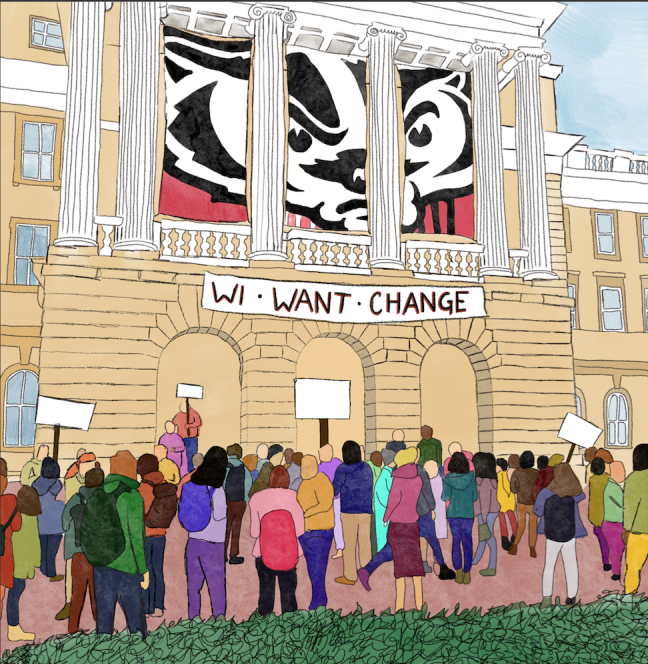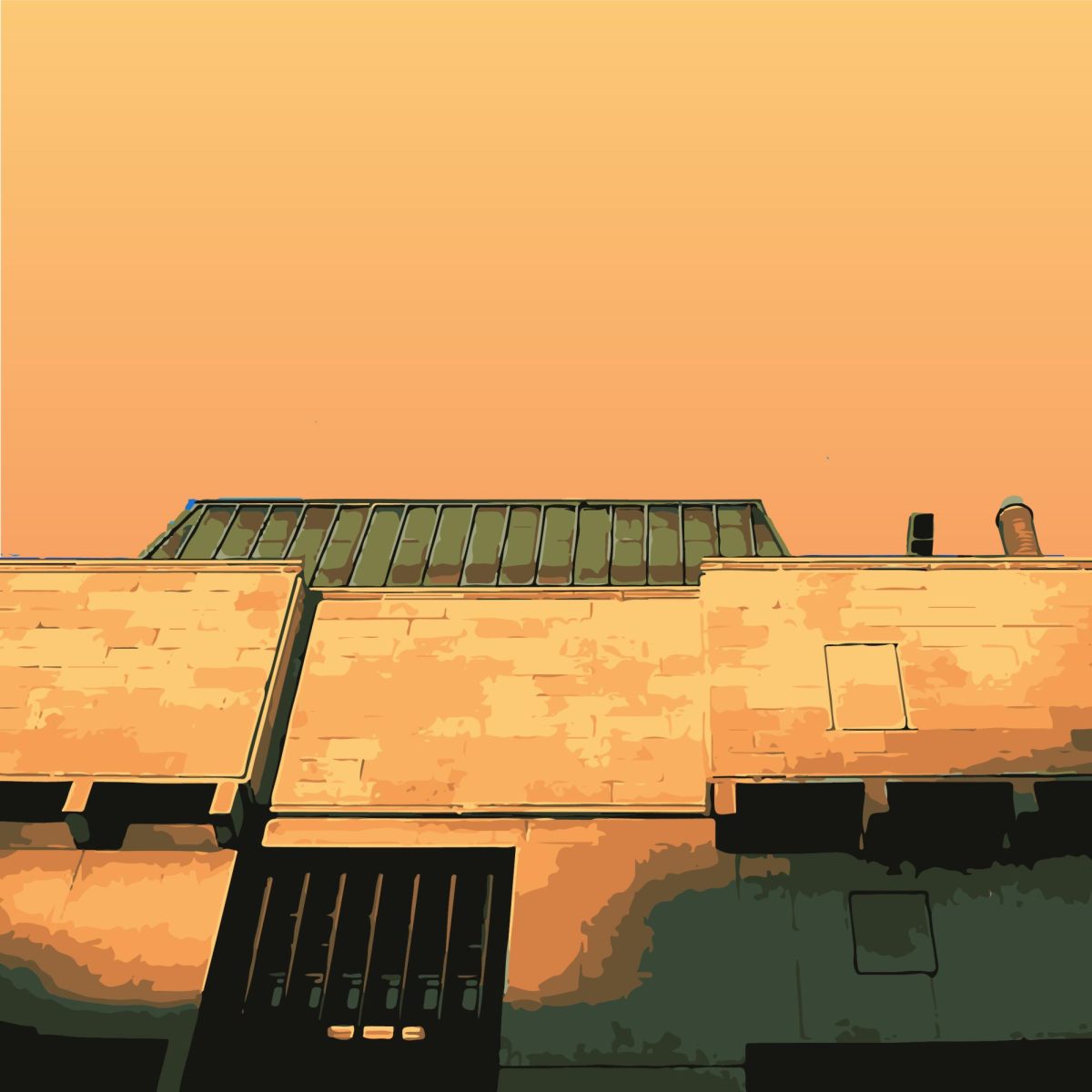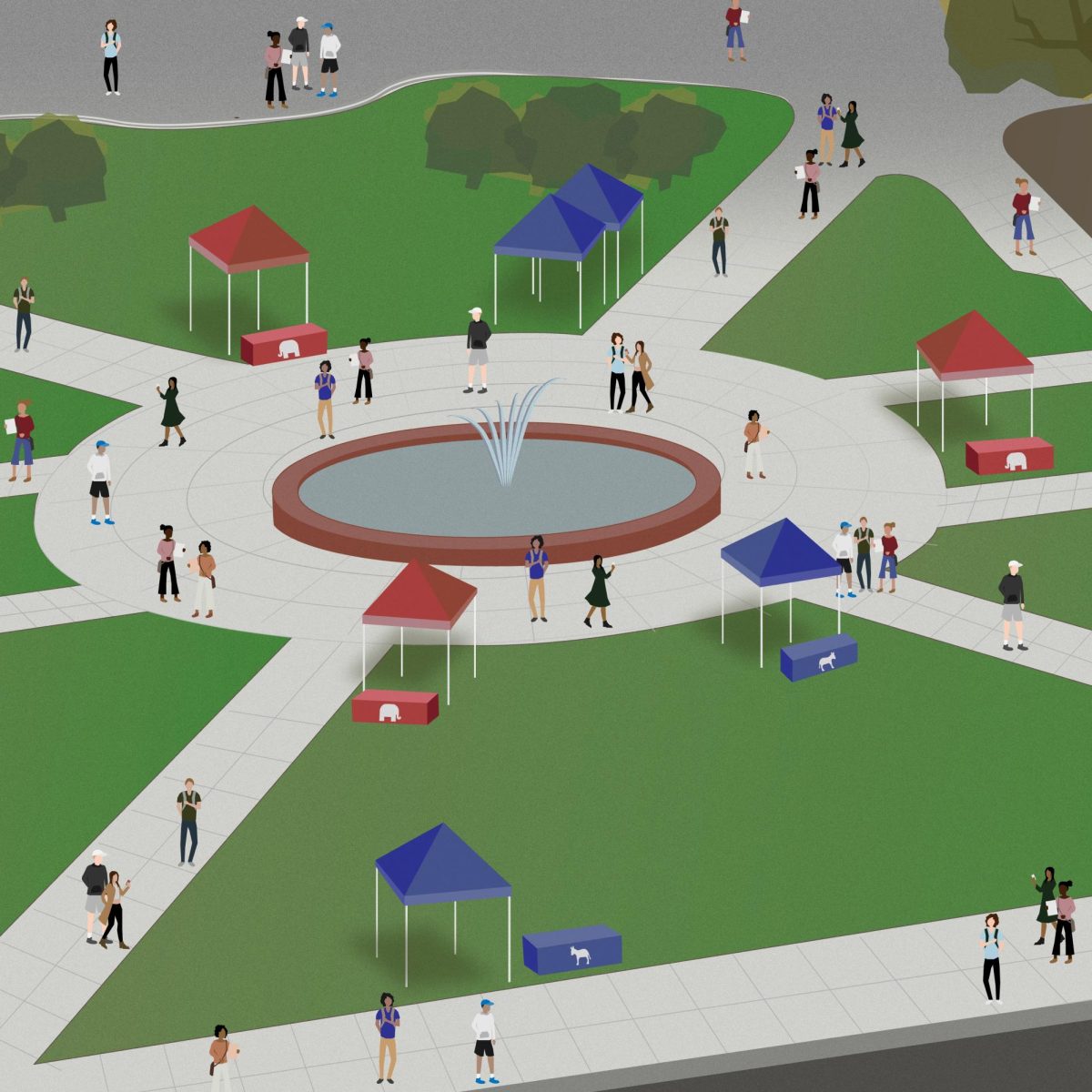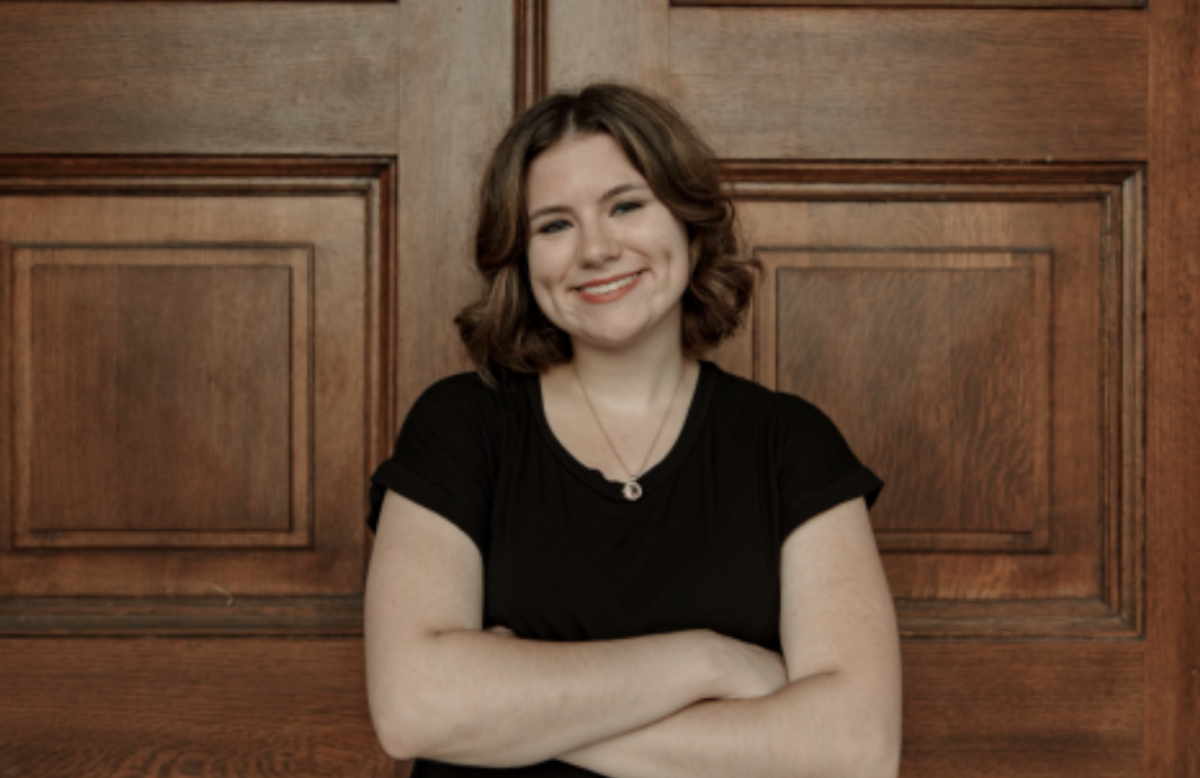“Whose streets? Our streets!” came the chants down East Washington Street, as protesters marched toward the Capitol. The protest, one of multiple, back-to-back protests that went on for days, was in support of the Black Lives Matter movement and a larger demand for policy reform.
Months earlier, “There is no donation on Earth you can make that makes up for the fact you are destroying the planet,” was the call at a fall 2019 protest for climate change awareness, highlighting the University of Wisconsin-Madison’s investments in oil and gas companies and demanding divestment.
And in 1969, as many as three thousand students demonstrated in front of ten campus buildings in the memorialized Black Student Strike. In an eerie foretelling, 900 Wisconsin National Guard troops were activated in response. Over fifty years later, Wisconsin again activated the National Guard to protect state buildings and infrastructure after protests for Black rights have again dominated the campus community — and now the city at large.
These protests, populated heavily by UW students, were ingrained with the theme of change. And as time passes and more and more students become publicly and openly involved with causes they care about, student activism is becoming entrenched in student life at UW.
At another protest for climate change, the crowd sang, “We’re gonna rise up, rise up till it’s won. People rise up, power come down.” That call grows louder and louder each day as UW students demand the changes they want to see.
[Campus] Climate Change
Marina Minic, a rising senior majoring in Chemistry and Environmental Studies, is on the Executive Board of CLEAN, or Campus Leaders for Energy Action Now. It’s a group that recently became an official registered student organization, and they work to push the administration to transition to 100% clean and renewable energy.
As part of CLEAN, Minic’s work has included helping get signatures on a petition to UW administration demanding the switch to clean energy. The petition currently has about 1,600 signatures, according to Minic, and has been dropped off to the Chancellor of the university, Rebecca Blank. She’s also been able to have discussions with both Blank and Melissa Nergard, UW’s director of Sustainability, regarding CLEAN’s goals for the university.
She’s part of the Wisconsin Student Climate Action Coalition, too, or WSCAC, a group created this past winter. Consisting of students who are also often primarily involved with other organizations, WSCAC helps groups collaborate on the cause.
Minic said her pathway to getting involved actually started in the classroom.
“I came into college pretty interested in environmentalism,” she said. “But it wasn’t until I took a film class freshman year that I started doing more. There was a unit in the class that talked about the environmental activism movement in the seventies and how it was actually pretty problematic in terms of equity and placing a lot of responsibility on indigenous people in this country.”
Minic said it “disturbed” her and woke her up to activism and doing it “properly.” Her freshman year, she said she got involved in doing Lakeshore cleanups and working with the Sierra Student Coalition on environmental appreciation.
As time passed, she decided on an environmental studies double major, in turn, and looked for work in the field. The summer after her freshman year, she worked for Environment Minnesota, the state chapter of the national Environment America group, and she worked on a campaign to ban polystyrene in the state. During her sophomore year, she got another internship with the Wisconsin chapter of EA.
“Through Environment Wisconsin, I got the position of UW’s campus Renewable Energy Coordinator. And that’s how I started doing research on the university’s renewable portfolio, and that’s how I found CLEAN,” she said. “So I started going to CLEAN meetings, and I became really good friends with everyone in the organization and ended up going on to the Executive Board. Since then, I’ve been ride-or-die for CLEAN.”
Her original goals and concerns about the inclusivity of protests, learned from the UW classroom, have not been forgotten years later. In a video covering the divestment campaign at UW, taken when Minic was a junior, she discussed the ties between climate change and marginalized communities.
“Climate change disproportionately affects a lot of marginalized communities. Communities of color, low-income communities, all feel it worse,” she said. “So I think that’s an integral part of why we’re even doing all of this. [We] fight for those who are contributing the least but feeling it the most.”
Rallying for Change
Tyson Holtz, a rising senior majoring in Spanish and Communication Arts, is actively involved in civil engagement, by protesting.
He started out as a member on the ASM Committee of Equity and Inclusion, where he advocated for trans rights. He said interacting with students at UW on the committee, and in general, helped him form the beliefs he now holds.
Part of those beliefs involve supporting the Black Lives Matter movement, and Holtz attends the local Madison protests regularly. Being white, he stressed the importance of being there to protest and show support for marginalized groups without making it about yourself.
“I’m there to uplift other people’s voices,” Holtz said.
He said getting involved in protesting was often through social media. Holtz said pages on Facebook are run by organizers and keep protestors and those wanting to get involved in the loop on ways to support.
He also added the importance of getting involved in student government.
“Join ASM. There are tons of subcommittees and you don’t really need to do a ton or be scared to be unqualified to get onto them,” he said. “You basically show up and are able to be a part of something, and that’s really cool, especially for freshmen.”
And it’s of note that groups and students have been able to force some of the changes they want to see. Holtz said that while he was on the subcommittee, he was able to make some tangible change on campus.
“We focused on gender neutral bathrooms, or like inclusive bathrooms on campus, because at the time, there weren’t too many in a lot of the buildings,” he said. “Since then, we’ve been able to get a lot more bathrooms, which is definitely a success on that end and helps to make people feel more accepted on campus.”
Minic said CLEAN had seen some changes made, too.
“The university’s planning on creating a Sustainability Advisory Council that’s going to launch in October 2020. And we got the preliminary list of board members last fall, and there was only one student on the board, and we just found that strange since the university is mostly made up of students, and students are more likely to have a more bold voice,” she said.
She said CLEAN and other students involved were horrified and immediately decided they would focus on making sure more student voices got on the board. They began petitioning, contacting administration officials and trying to be heard.
“So on our petition, one of our asks was to get more student seats on the board. And the administration actually ended up reaching out to us,” Minic said. “They asked if we would submit a proposal as to why and how we would put more students on the board.”
This past spring, CLEAN worked with ASM to create a joint proposal on how to add more students to the board. It went through, and now there will be an undergraduate and graduate student seat, with applications for the position currently being worked on.
“That was a direct result of our petition, which feels good that when you work hard and try to make change, sometimes it actually works. That’s really exciting,” Minic said. “Hopefully the university will be able to make some more bold climate action commitments.”
Student [in] Government
A unique facet of UW activism and involvement has been something many students might not realize is possible — being on local government as an elected official.
Elena Haasl is a rising junior, majoring in Community and Environmental Sociology and Political Science, and represents District 5 (a majority-student district) on the Dane County Board of Supervisors. On DCBS, they’re also on the Health and Human Needs Committee and Executive Committee. They took their place on the Board this past April, at age 20.
Making it onto local government started off way before Haasl even thought about running. They started out on the Campus Climate and Diversity Committee through the Associated Students of Madison (UW’s student government) Shared Governance Committee.
Haasl also was a student ambassador and student implementation board member for #IAmUW, chair of the College Democrats of Wisconsin Diversity Caucus, and outreach and membership director of College Democrats of UW-Madison.
As part of their overarching political involvement, Haasl worked on a city council campaign in Madison, where they discovered a love for local government. And it was through this work others noticed Haasl’s potential. They were told by people on the campaign they would be well suited to DCBS and the work it does.
Haasl set off contacting people on the board, trying to learn what they could about supervisors’ day-to-day work and responsibilities. Later, the then-District 5 supervisor, Hayley Young, contacted them. Haasl was informed Young wasn’t running for re-election and that she furthermore thought they would be a perfect fit for the job.
“And after a lot of deliberation, I was like, ‘Okay, I’ll do it,’” Haasl said. “I decided to run also because there wasn’t another student running for District 5, and I thought it’s really important to have student representation in a district that’s predominantly students.”
And so the campaign was set to begin. Haasl said perhaps, unsurprisingly, it wasn’t easy.
“I won’t lie, it was a lot of work. And it was tricky to balance school and work and running a campaign,” they said. “But thankfully, I had a really strong support network … it’s really cool to see a lot of people my age getting involved in local politics and getting experience. And for my campaign, it was really cool to see a whole group of students coming together to do this.”
The campaign, for students and by students, had effects that propagated beyond Haasl’s own election. Their former campaign manager, Nada Elmikashfi, is now running her own campaign for state senate.
To those wanting to get involved, Haasl has some advice borne of experience, too.
“I would say it’s actually really easy to get involved in politics and [get] to know local elected officials and even state representatives. You can join political organizations on campus, whether it’s College Democrats or Republicans, or party neutral organizations,” Haasl said. “You can get involved in causes that get people registered to vote or opportunities to go canvas and knock on doors. There’s opportunities to phone bank or take a digital approach to reaching out to people for the political process.”
Protest within Pandemic
In the era of COVID-19, where some may fear going out or engaging in-person, some UW students have found other means to work on the causes they care about.
Alexandria Beam, a rising junior majoring in Communication Sciences and Disorders, found a way to help out that doesn’t require her to leave her home and capitalizes on a theoretically unrelated skill she already had — jewelry making.
“I started making seed bead necklaces and bracelets earlier this year for my sisters and I to wear. A few months ago, as the Black Lives Matter movement was really gaining speed, I began reading into opportunities to support the cause,” she said. “One article I read encouraged artists and crafters like myself to use their talents as a means of raising money for organizations in need. After some research, I decided to raise money for the Innocence Project by crafting these necklaces and bracelets.”
Beam advertised her creations on social media platforms, and friends and family reached out within hours, inquiring purchase information. She credits some of that to the timing of current trends. Seed bead jewelry has become a popular summer accessory, and she said she figured that would help her reach a larger audience.
To date, she’s done two rounds of custom jewelry so far, adding up to around 20 pieces of jewelry. One hundred percent of the proceeds have been donated to The Innocence Project, a nonprofit that seeks to overturn wrongful convictions and reform the justice system.
Holtz also noted he tries to be active on social media about the causes he cares about.
“I have been very active on most of my social media platforms, which is very different for me. I used to never ever post anything on Instagram, and I didn’t really until around the end of May, when everything started really picking up. I realized I could not be silent,” Holtz said. “So that’s why I really started posting.”
Holtz said he wrote some statements on his own, specifically addressing those who, like him, are white. But he also stressed that he tried to post and share content from creators directly impacted by the causes he supported.
“I also share a lot of different posts made by Black creators and really just tried to not give my own beliefs. I just really tried to uplift Black voices,” he said. “If someone from my hometown hasn’t ever met a Black person, maybe they’ve met one or two in their lifetime, how are they ever going to hear these experiences if they don’t have voices being uplifted and shared on their timelines?”
Being from a predominantly white, conservative area, Holtz said social media was a huge tool for him — it’s accessible, takes fairly little effort to post on or share content and reaches a large audience fairly quickly.
If it happens to only reach a couple people, that’s okay too.
“Every single day I share something on Facebook. I make Instagram stories and retweet things on Twitter, and it may not be a lot, but I figure if there’s one or two people who see it and maybe disagree and want to talk about it, that’s still doing something,” he said.
Given the confusion surrounding COVID-19 and campus life, Minic is also working to make sure her messages on climate change get out despite the potential limitations. She said one focus will be thinking of projects that can continue their larger goal of pushing the administration toward clean energy. She’s hoping these projects can involve new students and be carried out despite COVID-19, like awareness campaigns or sharing relevant information on the subject.
Another goal is not only to support the students who will be on the Sustainability Advisory Council, but also make sure those elected are aware of what the student body at large is wanting to see happen.
And yet another focus will be utilizing the internet.
“Hopefully, we’ll be able to have some online petition drives and spread our petition to different organizations on campus, so that those groups can send them to their members,” Minic said. “I’m sure there’ll be a lot more social media engagement, in the age of COVID-19, and writing letters to the editors of different papers and things that people can see online.”
She added she wasn’t necessarily anticipating a downturn in efforts, just a change in how things are done.
“I think I think we’ll still be busy, it will just be a little different,” she said.








